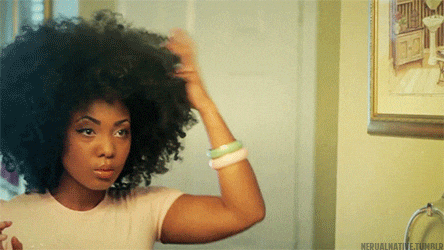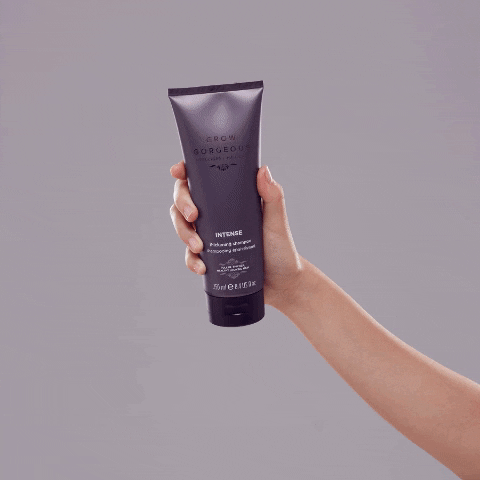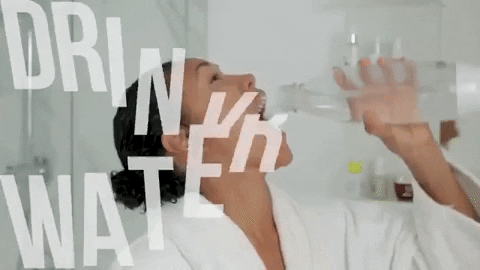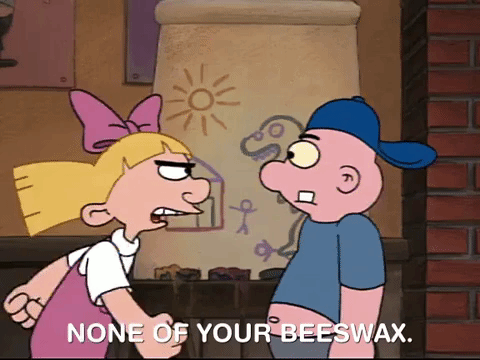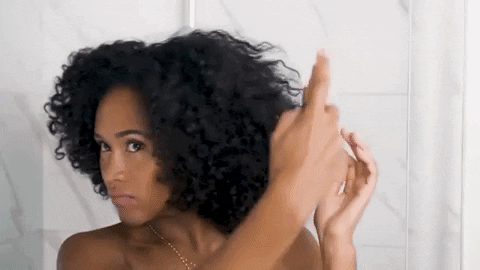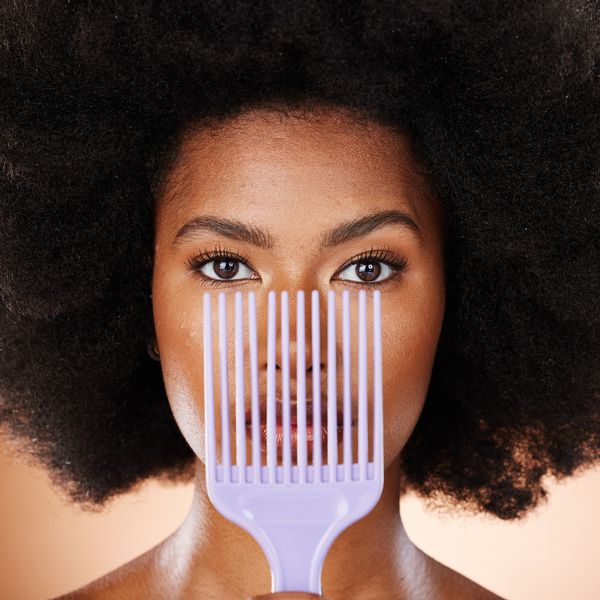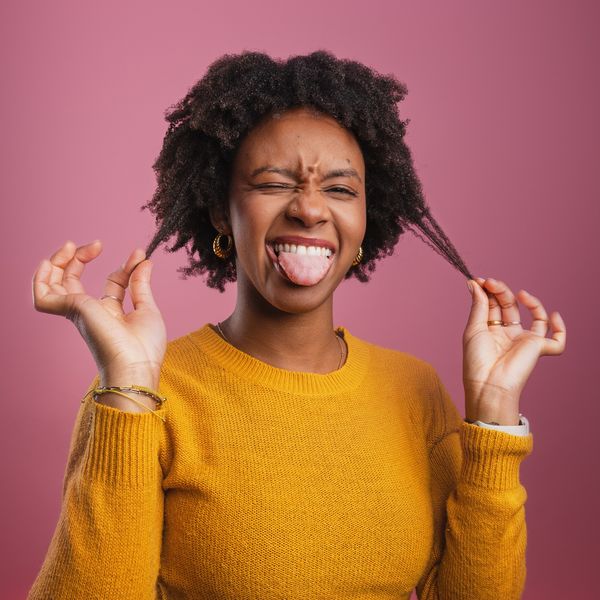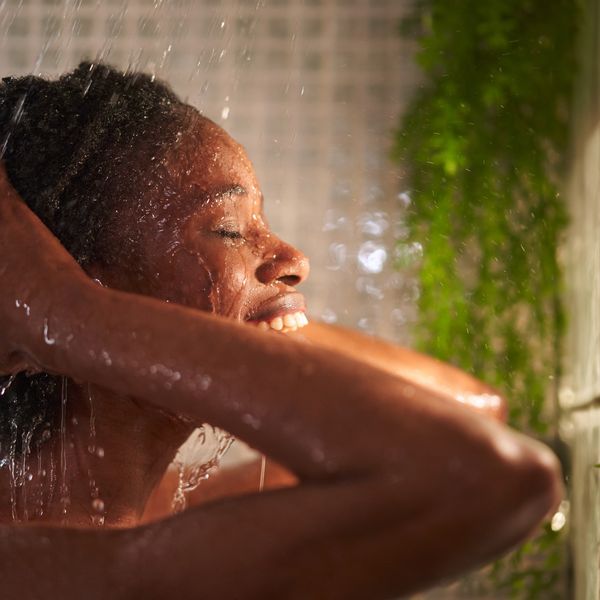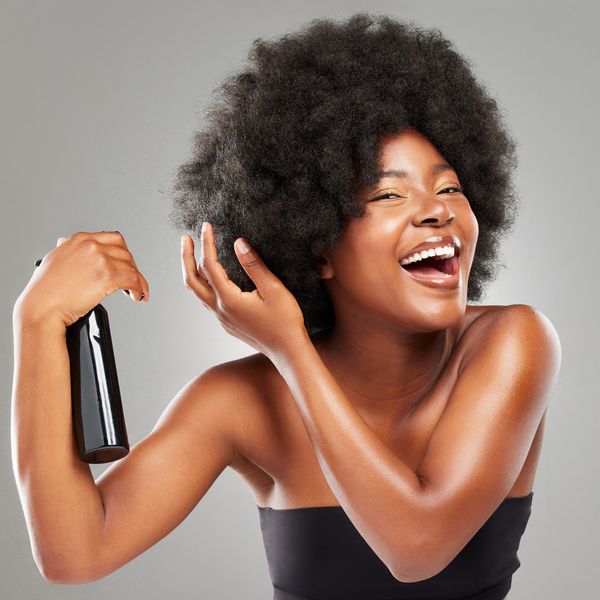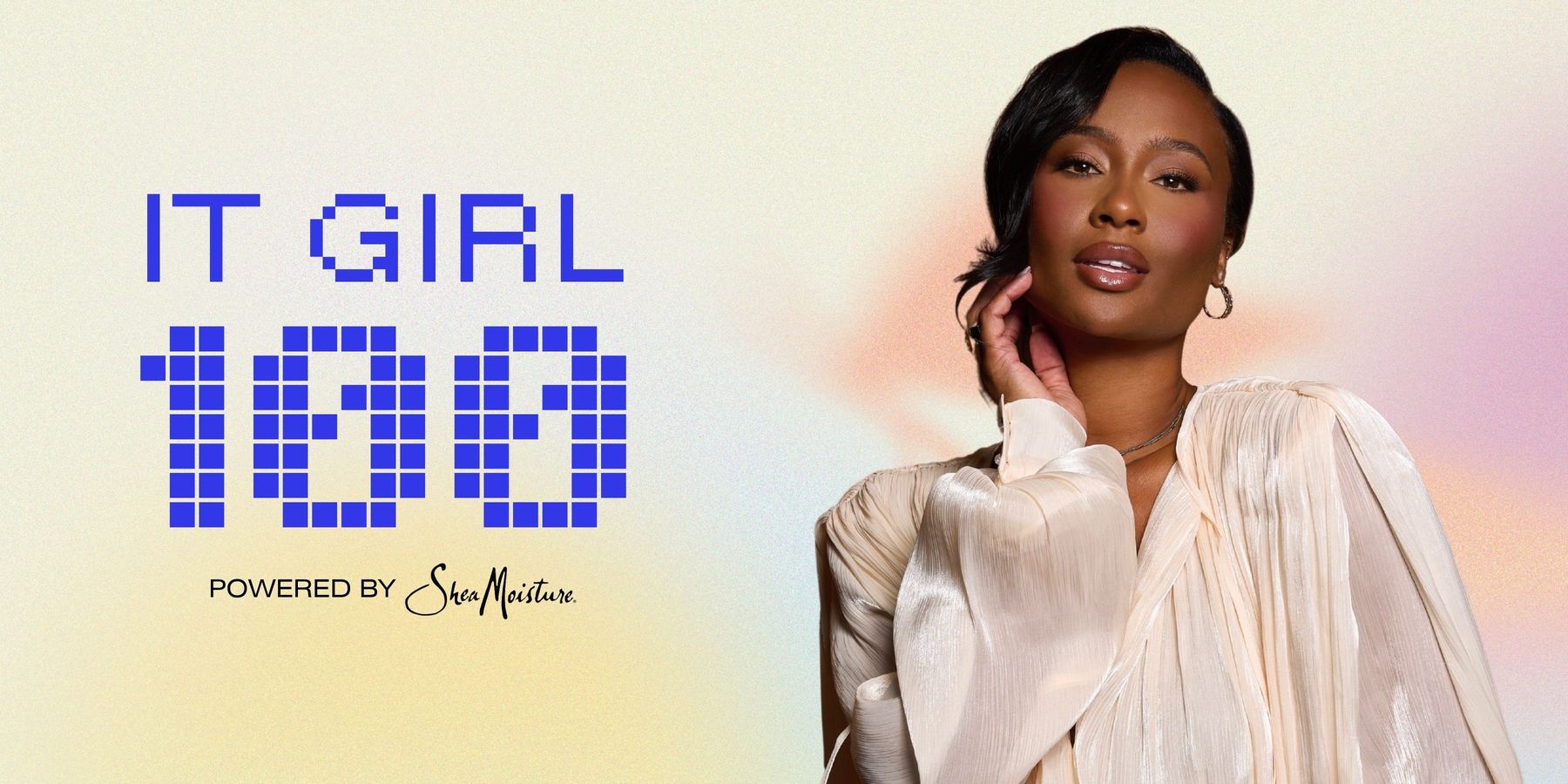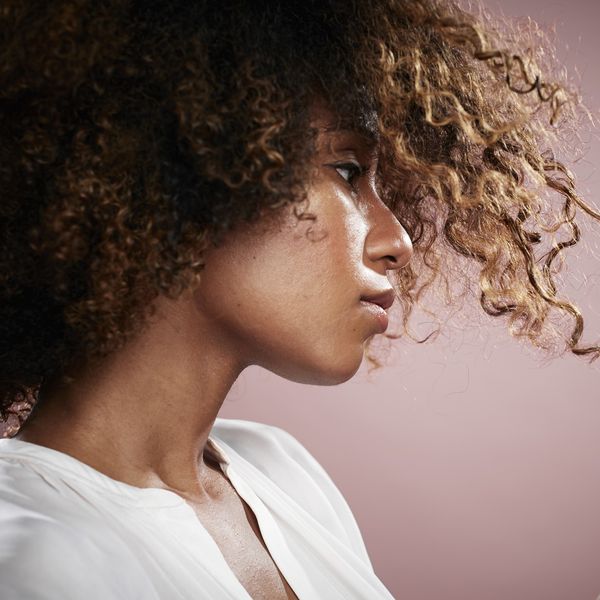
I don’t care what article on hair care you read — if it’s worth anything at all when it comes to the topic of how to prevent breakage and other forms of hair damage, it’s going to mention that your tresses need hydration. There is no way that it can endure the manipulation of styling and the heat that comes from certain styling tools any other way.
So, why is it that, when it comes to our hair — Black hair — maintaining moisture is such a constant struggle (especially the tighter our curls are)? The science behind it is that the curlier our hair is, the harder it becomes for the sebum from our scalp to cover our strands from root to tip (which is a great reminder to keep your scalp moisturized, by the way). However, as someone with high porosity hair who has found maintaining hydration to probably be my greatest hair challenge (as far as length retention goes), I think that failing to do certain things to our hair regularly plays as much of a vital role.
Today, let’s look into 10 things that you can do — things that I’ve personally done and continue to do — that can keep your hair full of moisture which will ultimately keep it strong and hella healthy.
1. Master Your Hair’s Porosity
I’m telling you from firsthand experience that, until/unless you learn what your hair’s porosity is (which is its ability to maintain water), you will never truly master how to keep it moisturized. My hair? It’s high porosity because my cuticles are open; this means that, although my locks take in hydration easily, I lose it almost just as fast.
"Low porosity" means that cuticles are so tightly bound that it’s hard to get hydration in; however, once moisture penetrates, it remains longer than it does in high-porosity hair. "Normal porosity" speaks to there being a pretty good balance.
Keeping all of this in mind, if you keep trying to get moisture into your hair without knowing its porosity, I can promise you that you are going to unnecessarily stress yourself (and probably your hair) out. So, if you’re not sure what yours is (for the record, porosity can also change due to things like chemical treatments and even age), this video here offers up DIY tests that are pretty effective and can help you understand your hair needs better.
2. Upgrade Your Deep Conditioning Practices
I’ve shared in other articles that it took years for me to start really deep conditioning my hair. I don’t mean just slapping on some conditioner, letting it sit for 5-10 minutes, and then going on about my day. I mean finding the kind of deep conditioner that would complement my hair type (including its porosity) and then allowing it to penetrate my hair shaft for no less than 30-45 minutes. Over the past couple of years, though, I’ve upped the ante even more.
Now I create my own cocktail of conditioners (hair bonding products and a hair oil like avocado or rosemary oil included), apply a generous amount of the blend to my damp hair, and then sit with a hair steaming bonnet on my head for at least an hour. I’m telling you, if you’ve never steamed your hair before, it is a real game-changer!
Not only does it help your hair conditioner to deeply penetrate your strands, it also helps to unclog the hair follicles on your scalp, increase hair elasticity, works to enhance your natural curl pattern, and prepares your hair to take in whatever products you plan to add to your hair after rinsing your deep conditioner out (like a leave-in conditioner; more on that later). So, whether you get a fancy steamer, a steam bonnet or you decide to stand in a hot shower for a while, always make steaming a part of your conditioning process — if you want more moisture, that is.
3. Use Water-Based Products
Reading labels on the back of hair products is so important if you want your locks to thrive. That said, when it comes to retaining hair moisture, it’s essential that you go for products that are water-based; this starts with ones that have water listed as the first ingredient on the label. When hair products have a lot of water in them, that helps to reduce dryness which can lead to breakage. For starters, you can find a list of some of the best water-based leave-in conditioners here.
4. Avoid Alcohol-Based Ones (Well, Some of Them)
Here’s the thing about hair products that have alcohol in them: some are bad, and others are actually pretty beneficial. As far as Cetearyl alcohol, lauryl alcohol, and benzyl alcohols (which are more of a hair product preservative than anything), these are helpful because they can actually help to soften and hydrate your hair. What I’m talking about here is ethanol, SD alcohol 40, propanol, isopropyl, and propyl types of alcohol; these are problematic because not only do they have the (strong) potential to dry out your hair on their own, but they also tend to strip your strands of the natural sebum that your scalp produces.
The bottom line here is to read the labels to see which type of alcohol is in the product that you’re considering. Also, even when it comes to the “good” ones, pay attention to how your hair feels 2-3 days after applying them. If it’s brittle or sticky, stop using it; it’s not helping.
5. Drink More Water
No matter how much water you put on your hair, you’re still going to need to be well-hydrated within. In fact, did you know that between 25-30 percent of your hair’s weight is made up of water? This means that, although it’s still being researched if dehydration is connected to hair loss, what you can know for sure is water helps to increase blood circulation to your scalp, helps your hair follicles to absorb nutrients, keeps your scalp hydrated, and water also helps to prevent brittleness which reduces breakage.
So yes, make sure that you get plenty of water into your system daily. Oh, and if you happen to be a tea lover, check out “10 Teas That Are Great For The Fall Season — As Far As Hair Growth Is Concerned” for ones that can hydrate your strands while benefitting them in other ways too.
6. Eat Fatty Acids and Antioxidants More Often
Speaking of “moisturized insides,” I can also vouch for the fact that adding certain foods to your diet can help keep your hair hydrated. For instance, did you know that fatty acids make up a whopping 85 percent of your hair’s lipid content? This is relevant because lipids help to maintain your hair’s strength and manageability not to mention its thickness, growth, and moisture. All of this is essential because you need things that are going to help you handle the manipulation that comes with styling your hair.
Antioxidants are good as well because they will help to keep your scalp healthy, reduce hair shedding, fight off free radicals, help to prevent UV damage (including how the sun can dry out your hair), slow down premature graying, increase circulation to your scalp and yes, maintain moisture. Foods that are full of fatty acids include salmon, kidney beans, cashews, peanuts, sunflower seeds, chia seeds, and egg yolks. Foods that are loaded with antioxidants include berries, artichokes, red cabbage, spinach, okra, collards and plums.
7. Try an ANTI-Humectant
You’re probably familiar with what a humectant is; it’s something that pulls moisture from the hair. As far as ones that are good for your hair, honey is a humectant that immediately comes to mind. Okay, so what is an anti-humectant? It's a product that will prevent moisture from leaving your hair once the moisture is already present. Therefore, if you’re someone who loses hair hydration a lot, an anti-humectant can be a real lifesaver for you (especially on the days when it’s hella humid and you want to reduce the appearance of frizz).
For the record, since anti-humectants include things like silicones and beeswax, if you’ve ever used either one of those, you probably already know that it’s best to take the “less is more” approach. Still, if you need some assistance keeping moisture around, an anti-humectant can make that happen for you. Check out a list of these types of hair products here and here.
8. Try Some Monoi Oil
If you’re not familiar with monoi oil, it’s an oil that comes from soaking the petals of Tahitian gardenias into coconut oil. I’m such a fan of it that I actually shouted the oil out in another hair care article a few years back (“What Your Natural Hair Needs This Spring Season”). Although it does things like help to strengthen your hair and reduce frizz, one of my favorite perks is monoi oil also helps to reduce split ends — and since split ends are the result of hair that is dry and brittle, well, you can see why you should consider giving it a shot; especially if length retention is your (ultimate) goal.
9. Make Leave-In Conditioner a Part of Your Nightly Hair Routine
Speaking of taking care of your ends, since that is the oldest part of your hair, you need to “baby” them more than any other part of your locks; otherwise, they are prone to breakage, and length will never be something that you will see much of. One way to do that is to give your ends more hydration by applying a leave-in conditioner to your ends no less than 2-3 times a week, whether you’re someone who rolls up your hair, braids, or twists it. My favorite for a while now has been Mielle’s Pomegranate & Honey Leave-In Conditioner. Some other options that you might want to check out are located here, here, and here.
10. Wrap Your Hair Up at Night
Y’all, please don’t underestimate the importance of wrapping your hair up at night — not just to avoid the friction that tossing and turning can cause (which can ultimately lead to breakage) but because it really is true that your hair can dry out if you are lying down for hours on end without some satin or silk on your head to protect it from your bedding. Listen, I have had seasons when I didn’t wrap my hair up and seasons when I did — when it comes to retaining moisture, the difference is like night and day whenever I do take out five extra minutes to do the step, I just talked about and then to cover it up with something that won’t absorb all of my efforts.
BONUS: Regularly Use a Finishing Spray
If you want your hair to have more sheen to it, you probably already know that oil sheen can make that happen for you. Okay, but what if you want to lightly condition your hair throughout the day? Then what? Something that I am a huge fan of is finishing and conditioning sprays. They tend to be light, they help to keep the cuticles of my strands smooth and my hair soft, and they are able to add movement (like when it comes to blowouts), too. Plus, they help my hair to feel moisturized. That’s why, I absolutely could not close this article out without shouting out the brand that I use: BB Smooth Sheen Conditioning Spray with Shea Butter.
To be honest with you, I have no idea how I even stumbled upon it in the first place, yet when I tell you that it is now a staple that I can’t see going without? It’s like it coats my hair and soothes my scalp without any (real) residue so that my hair remains moisturized until I come up and do my nighttime hair routine. Definitely a must-have if you’re trying to figure out how to keep your hair from drying out in between wash days. Hey, don’t say I never told you. It’s a winner. Promise you that!
So…what are you waiting on? Your parched hair is looking for relief, and now you know just what to do. Enjoy, sis. ENJOY.
Let’s make things inbox official! Sign up for the xoNecole newsletter for love, wellness, career, and exclusive content delivered straight to your inbox.
Featured image by JPM/Getty Images
- If Your Hair Keeps Breaking Off, You're Probably Doing This. ›
- Silk Press Season Is Underway & Here's What You Should Know About It ›
- Wear Your Crown: Here's How To Care For Your Huge Afro ›
Exclusive: Viral It Girl Kayla Nicole Is Reclaiming The Mic—And The Narrative
It’s nice to have a podcast when you’re constantly trending online. One week after setting timelines ablaze on Halloween, Kayla Nicole released an episode of her Dear Media pop culture podcast, The Pre-Game, where she took listeners behind the scenes of her viral costume.
The 34-year-old had been torn between dressing up as Beyoncé or Toni Braxton, she says in the episode. She couldn’t decide which version of Bey she’d be, though. Two days before the holiday, she locked in her choice, filming a short recreation of Braxton’s “He Wasn’t Man Enough for Me” music video that has since garnered nearly 6.5M views on TikTok.
Kayla Nicole says she wore a dress that was once worn by Braxton herself for the Halloween costume. “It’s not a secret Toni is more on the petite side. I’m obsessed with all 5’2” of her,” she tells xoNecole via email. “But I’m 5’10'' and not missing any meals, honey, so to my surprise, when I got the dress and it actually fit, I knew it was destiny.”
The episode was the perfect way for the multihyphenate to take control of her own narrative. By addressing the viral moment on her own platform, she was able to stir the conversation and keep the focus on her adoration for Braxton, an artist she says she grew up listening to and who still makes her most-played playlist every year. Elsewhere, she likely would’ve received questions about whether or not the costume was a subliminal aimed at her ex-boyfriend and his pop star fiancée. “I think that people will try to project their own narratives, right?” she said, hinting at this in the episode. “But, for me personally – I think it’s very important to say this in this moment – I’m not in the business of tearing other women down. I’m in the business of celebrating them.”
Kayla Nicole is among xoNecole’s It Girl 100 Class of 2025, powered by SheaMoisture, recognized in the Viral Voices category for her work in media and the trends she sets on our timelines, all while prioritizing her own mental and physical health. As she puts it: “Yes, I’m curating conversations on my podcast The Pre-Game, and cultivating community with my wellness brand Tribe Therepē.”
Despite being the frequent topic of conversation online, Kayla Nicole says she’s learning to take advantage of her growing social media platform without becoming consumed by it. “I refuse to let the internet consume me. It’s supposed to be a resource and tool for connection, so if it becomes anything beyond that I will log out,” she says.
On The Pre-Game, which launched earlier this year, she has positioned herself as listeners “homegirl.” “There’s definitely a delicate dance between being genuine and oversharing, and I’ve had to learn that the hard way. Now I share from a place of reflection, not reaction,” she says. “If it can help someone feel seen or less alone, I’ll talk about it within reason. But I’ve certainly learned to protect parts of my life that I cherish most. I share what serves connection but doesn’t cost me peace.
"I refuse to let the internet consume me. It’s supposed to be a resource and tool for connection, so if it becomes anything beyond that I will log out."

Credit: Malcolm Roberson
Throughout each episode, she sips a cocktail and addresses trending topics (even when they involve herself). It’s a platform the Pepperdine University alumnus has been preparing to have since she graduated with a degree in broadcast journalism, with a concentration in political science.
“I just knew I was going to end up on a local news network at the head anchor table, breaking high speed chases, and tossing it to the weather girl,” she says. Instead, she ended up working as an assistant at TMZ before covering sports as a freelance reporter. (She’s said she didn’t work for ESPN, despite previous reports saying otherwise.) The Pre-Game combines her love for pop culture and sports in a way that once felt inaccessible to her in traditional media.
She’s not just a podcaster, though. When she’s not behind the mic, taking acting classes or making her New York Fashion Week debut, Kayla Nicole is also busy elevating her wellness brand Tribe Therepē, where she shares her workouts and the workout equipment that helps her look chic while staying fit. She says the brand will add apparel to its line up in early 2026.
“Tribe Therepē has evolved into exactly what I have always envisioned. A community of women who care about being fit not just for the aesthetic, but for their mental and emotional well-being too. It’s grounded. It’s feminine. It’s strong,” she says. “And honestly, it's a reflection of where I am in my life right now. I feel so damn good - mentally, emotionally, and physically. And I am grateful to be in a space where I can pour that love and light back into the community that continues to pour into me.”
Tap into the full It Girl 100 Class of 2025 and meet all the women changing game this year and beyond. See the full list here.
Featured image by Malcolm Roberson
More Than Gratitude: 7 Signs You're Struggling With Contentment In Your Life
If Thanksgiving happens to be your favorite holiday — or you just happen to be a longstanding participant of it — then there is one tradition that you are probably familiar with. Usually, before everyone eats, each individual expresses at least one thing that they are grateful for. I actually think that is one of the best things about the holiday because it reminds people to slow down and really reflect on how to be in the moment and think about the blessings that they have. And that, my friend, is what gets folks into the mindset of knowing how to be…content — even if it’s just for a brief moment.
Contentment. By definition, it’s the state of not only being “satisfied with what one is or has” but also “not wanting more or anything else.” And you know what? Although it might not be a popular aspiration of many, it is a sign of spiritual maturity on certain levels. After all, it is the Apostle Paul who once said, “Not that I speak in regard to need, for I have learned in whatever state I am, to be content…” (Philippians 4:19 — NKJV).
Being content is about not complaining. Being content is about learning to be comfortable in your present circumstances. Being content is about choosing to find joy and fulfillment, on some level, and in some way, on a daily basis.
Personally, I dig all of this so much because when you have mastered true inner contentment, it creates stability, self-awareness, and a type of resilience that makes you…shoot, powerful beyond measure, if you ask me. Because when someone knows how to “find the good” and “make peace,” regardless of what is going on around them, they truly are unstoppable. Yeah, on so many levels, contentment is the ultimate life hack. It’s something that each and every one of us should aspire to become: completely and genuinely content.
Thanksgiving is basically moments away at this point. In preparation for that time of self-reflection, pour yourself a glass of wine, turn on some soft music, sit on your coach, and then ask yourself, “Am I content?” If you’re not sure (or you need the definition unpacked for you just a bit more), here are seven signs that you may not be…and yet, there is no time like the present to do something about it.
1. You’re Super Impatient
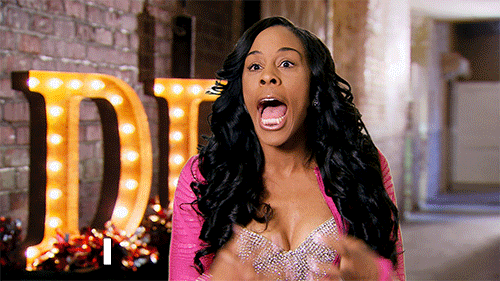 Giphy
GiphyHonestly, putting another Scripture right here could be all that is needed in order to bring this point to a swift and abrupt end. Which one? I Corinthians 13, the Love Chapter, starts off with “Love is patient” (I Corinthians 13:4). Yeah, if you want to know if you love yourself and love yourself well, how patient are you…including with yourself? Throughout the years, I have shared one of my favorite definitions of "patient" in several different articles: “bearing provocation, annoyance, misfortune, delay, hardship, pain, etc., with fortitude and calm and without complaint, anger, or the like.” For me, it’s a blaring reminder that mastering patience isn’t just about waiting (more on that in a sec); it’s about waiting with grace.
Content people can do this because, on some level, they know how to apply the John Piper quote, "God is always doing 10,000 things in your life, and you may be aware of three of them." Another way of looking at this is people who can wait well — without complaining or getting annoyed by delays or challenges in the meantime — get that in order for things to truly come together, there are lots of moving parts…some that they don’t even know about. And so, if they want the best outcome, yes, waiting well is oftentimes not just involved; it is required.
Impatient people don’t get any of this. That’s why they are so stressed out all of the time.
2. You’re Worried About Things You Can’t Control
 Giphy
GiphyThis. Past. Election. Chile. And then the cabinet that that man is putting together as we speak? I don’t even want to get my blood pressure up, expounding on it. Let me just pivot by adding one more Scripture — because it is beyond fitting: “Therefore do not worry about tomorrow, for tomorrow will worry about its own things. Sufficient for the day is its own trouble.” (Matthew 6:34 — NKJV)
Although worrying is something that pretty much everyone does at one point or another, one of my favorite quotes on it is by an American humorist by the name of Erma Bombeck: “Worry is like a rocking chair: it gives you something to do but never gets you anywhere.” And really, when you stop to really think about worrying, isn’t that the truth? For one thing, all worrying does, by definition, is cause you to torment yourself by focusing on things that aren’t even going to happen (somewhere between 85-90 percent of the time, in fact; there is actually a science on that) or trying to control things that are beyond your control.
If being a worry wart is your internal struggle, my advice would be to look at life this way: If you’re worried that you’re about to get written up for getting to work late again, leave your house earlier — you can control that. On the other hand, if you’re worried that you’re going to get laid off before the holiday season ends, so long as you’ve been doing your best (which is also something that you can control), please put your energy elsewhere because that is something that you can’t control.
And I promise that when you choose to be calm and confident over worrying yourself to death, that can help you to manage what you can’t control so much easier. Oh, and your health will thank you, too, because worry is attached to things like insomnia, muscle tension, headaches, overeating, and drinking too much. All this over things that probably won’t happen in the first place? Yeah, sis…(choose to) relax.
And by choosing to chill out, there is some contentment that follows because you will see the good as much as, if not more than, the potential bad. Trust me.
3. The Past and/or Future Consume You
 Giphy
GiphyOn the heels of the Scripture that I just provided for the previous point, it also applies to this one. You know, back when I was doing some intentional research on forgiveness, I always appreciated the insight of author Gary Zukav: “Forgiveness is accepting that the past cannot change.” While this doesn’t mean that you shouldn’t hold people accountable for what they have done, it does help you to be compassionate with those who are truly sorry (check out “Heads Up: It's NOT An Apology If An Amend Isn't Made”) because, no matter what has transpired between you and them, one thing they can’t do is go back into a time machine and change it.
And you know what? When it comes to the mistakes — or, let’s be real, sometimes they are conscious poor decisions — you have made, you can’t either. So, why let their misdeeds or your own consume you to the point of internally destroying you?
Then there’s the future. What if you get robbed? What if your mom gets cancer? What if your husband files for divorce? Girl, if you are caught up in the future that hasn’t even happened yet, you are definitely gonna drive yourself up the wall! And this is why so many mental health experts and platforms are all about encouraging individuals to live in the moment. You can do this by meditating, taking breaks from social media (and the news), journaling, doing things that you enjoy (instead of waiting to put them off), and resting.
Listen, one of the best things about choosing to only focus on the here and now is you can find little things about it to be content with — and that helps you to be/become more content overall.
4. You Always Think About Wanting More
 Giphy
GiphyAlthough it certainly wasn’t my plan for this piece to be so Scripture-heavy, I’ve got to flow with what immediately comes to mind and, for this point, the verse, “So are the ways of everyone who is greedy for gain; It takes away the life of its owners” (Proverbs 1:19 — NKJV) is it. And just what does it mean to be greedy? A greedy individual isn’t just low-key obsessed with getting and having more — please catch it — they are also quite EAGER.
Eager folks also tend to be impatient. Eager folks are perceived by others as being very intense (and not in a good way). More times than not, eager folks haven’t really mastered how to take a moment to appreciate what they do have because all they care about is what’s next. And when you’re in a state of that kind of, well, anxiety…how could it not affect your quality of life? I mean, really.
And what if you read all of that and said, “I’m not greedy; I’m just ambitious” — listen, there is nothing wrong with having goals and wanting to obtain them. However, an ambitious individual knows how to find balance. If they get a promotion, they will schedule a vacation to celebrate it. If they just got a new car, they are not in a rush to get a new house until they can financially afford it. If they were just proposed to with a really nice ring, they aren’t hounding their new fiancé about setting a date within the next two weeks.
People who always want more, without taking the time to enjoy what they already have, are never going to be content. Why? Because there is always something else that you can want…even if you don’t need it or it really isn’t the time for it. Meanwhile, content people get that it’s a good thing to not go after everything all of the time; that it’s far wiser to embrace what is already before them — because some folks don’t even have…that.
5. You Compare Yourself to Others
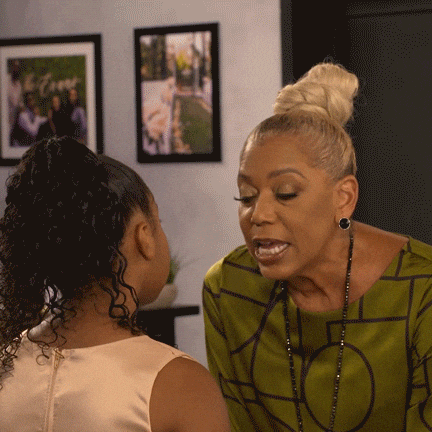 Giphy
GiphySomething that I actually get asked fairly often is, do I feel “some type of way” that I do so much work in the realm of marriage when I’ve never been married myself. The short answer is “absolutely not” because I know that I could’ve been married, a few times over, at this point; however, I am just as intentional about not wanting to be divorced as I am about being in a healthy marriage, not just “a marriage.”
I’m grateful to be in that head and heart space too; otherwise, I would be out here comparing myself to other people — and there is nothing good, healthy, wise, profitable, or beneficial about doing that. In fact, science isn’t a fan of playing the “keeping up with the Joneses” game, either.
According to science, that can ultimately do things like lower your self-esteem, cause you to only see the bad/negative things in your world (in comparison to other people), and it can jack up your perception of what’s really going on with other people. For instance, if you’re 33 and comparing yourself to your friends who are already married and parents, you might want to talk to them about what their day-to-day, beyond their IG posts, is like.
Because while prayerfully, their life is filled with many blessings, if they are being totally honest with you, they will also share that you’ve got some “pros” to your life too (honey, there are some real benefits to being single; check out “If You're Not In Love With Being Single, Ask Yourself These 6 Questions.,” “10 Bona Fide Benefits Of Being Single,” and “10 Words That'll Make You Totally Rethink The Word 'Single'”). Content people get that every season does — because it’s true.
6. You Don’t Verbalize Gratitude Often
 Giphy
GiphyThere is someone in my world who I actually try to avoid as much as possible. It’s not that she’s not smart, and honestly, she’s one of the funniest individuals that I’ve ever known (and I’ve known her for most of my adult life). It’s just that…she is always wanting something, and I find that to make her a very draining individual. Lawd, even as I am typing all of this out, I’m trying to recall a time when I’ve heard her say, “thank you” for something (no joke), let alone express any form of genuine gratitude. She’s just got such a sense of entitlement that whatever she does receive, she thinks she’s owed and what she doesn’t have, she believes that something is wrong if it hasn’t arrived yet. Geeze, what a horrible type of existence.
You don’t have to take my word for it either because there is plenty of data out here to support that people who don’t take the time to be grateful for what they have ended up being unhappy, more stressed out, in more physical pain (yes, literally) and definitely more negative than everyone else — which would explain why people don’t like hanging out with them as much.
So, since this is the time when gratitude is the theme of the season, think about what you are grateful for when it comes to what you’ve accomplished this year, then write it down and post it up somewhere. Then, as far as the individuals, for whom you are grateful for — send them a handwritten note, get them a gift card to their favorite coffee shop, or even just call to tell them.
One of the most beautiful things about being in a state of contentment is it reminds you of a lot of what you already have. It really is enough…for now…in this very moment.
7. Being (and Living) Satisfied Is a Foreign Concept to You
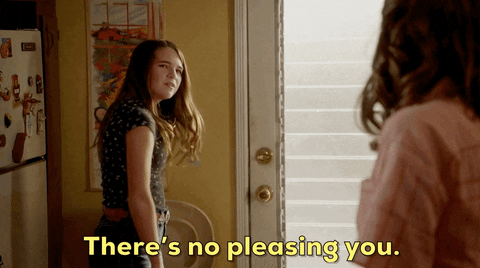 Giphy
Giphy“Tubi movies” really is a complete sentence. LOL. And yes, sometimes, when I’m taking a writing break, I will check out some of the most…I-wouldn’t-normally ones, just to lend my support. In walks Never Satisfied with its own self-explanatory meaning. Y’all, it really is oh so true that there are folks out here dealing with some unpredictable and sometimes even truly dire consequences — and it’s all because they didn’t know how to sit down somewhere and learn how to be satisfied with the people, places, things, and ideas that they already have.
That said, I am indeed a quotes gal, and one of my favorites on the topic of satisfaction is by actor Christopher Reeve: “Success is finding satisfaction in giving a little more than you take,” and although I don’t do what I’m about to do often (because I try to take Matthew 6:1-4 very literally and seriously), I’m going to illustrate what he said about satisfaction by sharing a recent situation.
This past week, a nurse practitioner (I prefer those to doctors) diagnosed me with wrist tendonitis for the first time in my life. If you knew how many keystrokes that I do a day, you’d probably be shocked that it took this long. Anyway, as I was waiting in line to get a prescription, a young Black man was basically freaking out because his insurance was refusing to cover his own meds. According to what he was telling the pharmacist, he always only pays $5; however, this time, they were charging $62, he simply didn’t have it, and the insurance company was not picking up.
As I watched him shaking and sweating while saying that he really needed it today and fretting while talking to his mom on the phone, I offered to cover it — and after going back and forth with him for about three minutes, I did. In my mind, although I didn’t plan on spending about $85 (total) that day, the little inconvenience that it was costing me was nothing in comparison to how much it was going to benefit him — I could tell from how he and his mother reacted (even the pharmacist mouthed “thank you so much”), and that is what made it money well spent.
To help someone who had no way of helping themselves in the moment? That brought me a lot of satisfaction because it’s nice to lighten someone’s load while leaving it to karma to handle it. ALL OF IT.
And that’s why I thought it was best to wrap all of this up with a reminder that being satisfied is being content. And when you can be so satisfied with your life that you want to help others? That is a level of contentment that is truly unmatched because you start looking for ways to bless others simply so that they can feel just as content as you do.
____
Our culture? It really is never satisfied, which explains why a lot of people are so miserable. SMDH. You don’t have to be like the masses, though. This Thanksgiving, please purpose in your mind (and heart) to be(come) more content. It will make you a rare gem that benefits everyone and everything around you.
Including yourself, sis. No doubt about it.
Let’s make things inbox official! Sign up for the xoNecole newsletter for love, wellness, career, and exclusive content delivered straight to your inbox.
Featured image by Shutterstock
Originally published on November 28, 2024



